|
|
|
Sort Order |
|
|
|
Items / Page
|
|
|
|
|
|
|
| Srl | Item |
| 1 |
ID:
121109
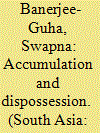

|
|
|
|
|
| Publication |
2013.
|
| Summary/Abstract |
Space and its reconstruction has emerged as one of the foremost devices of capitalist development. In this context, this paper attempts to develop a critique of the prevailing logic of 'development' in India. It argues that the contextual realities of the current exclusionist economic policy in India are defined not only by the nexus of the neo-liberal policy regime and disciplinary political authority, but also by the resistance and struggles of the dispossessed.
|
|
|
|
|
|
|
|
|
|
|
|
|
|
|
|
| 2 |
ID:
171939


|
|
|
|
|
| Summary/Abstract |
International monetary organisations argue the ‘developing countries’ should foster linkages to the world economy as a means to overcome backwardness. In this article we refute the narrative that Mexico has experienced industrial upgrading. Rather, industrial growth in Mexico over the last 40 years has been shaped by neoliberal economic policies which have turned the Mexican economy into an export-led manufacturing platform designed to supply the North American market, sustained by a precarious labour market. As a result, Mexico occupies the most labour-intensive and low value-added segments of regional production chains. To make this argument, we perform an in-depth analysis of the Mexican automotive industry, demonstrating that instead of being an engine for domestic industrial development, the auto industry has become a dominant economic sector through productive hyper-specialisation concentrated in the northern Mexican border states, a reliance on transnational capital, particularly from the United States, a disconnect with domestic markets, and the super-exploitation of labour.
|
|
|
|
|
|
|
|
|
|
|
|
|
|
|
|
| 3 |
ID:
153253
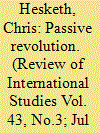

|
|
|
|
|
| Summary/Abstract |
In this article, I argue that Antonio Gramsci’s concept of passive revolution makes a foundational contribution to International Relations (IR), yet has been relatively under appreciated by the broader discipline. Within the Historical Sociology of International Relations, uneven and combined development has recently been postulated as a key trans-historical law that provides a social theory of the ‘international’. Drawing from, but moving beyond these debates, I will argue that passive revolution is a key conditioning factor of capitalist modernity. I will demonstrate how the concept of passive revolution is the element that explains the connection between the universal process of uneven development and the manner in which specific combinations occur within the capitalist era as geopolitical pressures, in tandem with domestic social forces become internalised into geographically specific state forms. It therefore offers a corrective to the frequently aspatial view that is found in much of the literature in IR regarding uneven and combined development. Additionally, passive revolution provides a more politicised understanding of the present as well as an important theoretical lesson in relation to what needs to be done to affect alternative trajectories of development.
|
|
|
|
|
|
|
|
|
|
|
|
|
|
|
|
| 4 |
ID:
152085


|
|
|
|
|
| Summary/Abstract |
This paper explores the relationship between ground rent, production and knowledge in Ecuador’s neo-structuralist, state-led project to transform the productive matrix. Based upon insights from the Marxian approach to the critique of political economy, we interrogate how neo-structuralism has conceptualised the relationship between ‘natural resource income’ and ‘knowledge-based’ economic development. The paper argues that a rent-theoretical perspective, which takes seriously the regional unfolding of uneven geographical development in Latin America, can highlight the limits of a national development plan conceived according to the logic of Schumpeterian efficiency. In doing so, the paper identifies the contradictory relationship between natural resource exports, state-led ‘knowledge’-based development and capital accumulation. On this basis the paper offers a historically and empirically informed critical analysis of selective import substitution industrialisation and vanguard science and technology strategies designed to transition Ecuador away from primary resource dependence.
|
|
|
|
|
|
|
|
|
|
|
|
|
|
|
|
| 5 |
ID:
139678
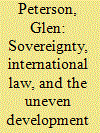

|
|
|
|
|
| Summary/Abstract |
When we think about the history of the international refugee regime, why is it that—with a few carefully delineated exceptions—there were no non-European ‘refugees’ until the 1950s? This article offers a critical examination of existing scholarship on the history of the international refugee regime and suggests some alternative pathways for future research. The article has three broad objectives. The first is to propose an outline for an alternative history of the international refugee regime, one in which the non-European and colonial worlds are not invisible or peripheral but rather central to the main narrative. The second is to ask what place Chinese migrants might occupy in such an alternative history of human displacement, stretching over the course of the twentieth century. Finally, this article tries to show that the period from 1945 to the early 1960s was an especially critical one in the history of the international refugee regime, one in which refugee movements both out of and into the People's Republic of China were critical in generating the kinds of tensions and contradictions that emerged when the international refugee regime was transposed from Europe onto colonial and post-colonial Asia.
|
|
|
|
|
|
|
|
|
|
|
|
|
|
|
|
| 6 |
ID:
187739
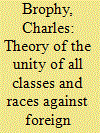

|
|
|
|
|
| Summary/Abstract |
Based on the writings of James Puthucheary in the late 1950s and early 1960s, this article seeks to highlight Puthucheary's contribution to debates within the Malayan Left on the national question. It will highlight Puthucheary's situating of the Malayan Left within a wider transnational flow of nationalist, anti-imperialist, and socialist thought, as well as his attempt—through his own Marxist-influenced assessment of the Malayan situation—to answer the political problem of the relationship between socialist politics and nationalism in Malaya. In doing so the article will highlight the way in which Puthucheary's own position on questions of education and language policy placed him in opposition to dominant trends within the Malayan Communist Party and the left-wing of the People's Action Party, provided a theorizing of the need for nation-building within Malayan socialism, and contributed towards a socialist politics which placed emphasis upon economic development and cultural nation-building from the perspective of the Malay peasantry. The article finally goes on to explore Puthucheary's subsequent disengagement from politics in the early 1960s and the growing limitations of a socialist politics of nation-building in Malaya, which led Puthucheary and others on the Left to contribute towards a programme of nation-building within existing institutions and parties in the 1960s and 1970s.
|
|
|
|
|
|
|
|
|
|
|
|
|
|
|
|
| 7 |
ID:
162539
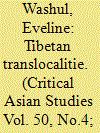

|
|
|
|
|
| Summary/Abstract |
Urban development in Tibetan areas of China lags behind that of other non-coastal, rural areas and occurs at a significantly smaller scale due to remote and mountainous terrain and a lower population density. However, just as in the rest of China, urban development in Tibetan regions is characterized by an unevenness that constitutes and produces new translocal ties, as people belong to multiple localities at the same time. But Tibetan patterns of translocal ties are unique. For college-educated Tibetans, structural factors such as educational institutions and ethnic discrimination and affective factors such as attachment to home places powerfully shape the landscape of urban opportunities along ethnic lines. Instead of educational and employment structures enabling Tibetans to pursue economic opportunities in urban centers across the country, socio-ethnic inequalities and thick relational ties eventually bring many Tibetan graduates back to the urban centers administratively connected to their rural home places in Tibetan areas.
|
|
|
|
|
|
|
|
|
|
|
|
|
|
|
|
| 8 |
ID:
167579
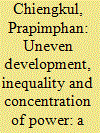

|
|
|
|
|
| Summary/Abstract |
This article provides a critique of the Thailand 4.0 strategy to push the country out of the middle-income trap through innovation-driven, inclusive and sustainable growth. First, it argues that the policies have insufficiently analysed the persistence of structural hierarchy and uneven development in the global political economy, which will constrain Thailand’s catch-up success in the future. Second, based on writings about progressive mission-led industrial strategies, it is argued that Thailand 4.0 ought to embed a progressive social and environmental agenda more clearly in its industrial strategy. Third, it is argued that Thailand 4.0 neglects to address the high concentration of political and economic power in the country, and also continues to allow unequal access to the policymaking process that has led to socio-environmental problems. Overall, this article argues that Thailand 4.0 will increasingly aggravate the two-tier fragmented nature of the political economic system of Thailand, where few can reap the biggest shares of the surplus and participate in more advanced sectors of the economy. It also calls for a more progressive industrial strategy and an alternative developmental path.
|
|
|
|
|
|
|
|
|
|
|
|
|
|
|
|
| 9 |
ID:
171528


|
|
|
|
|
| Summary/Abstract |
This paper problematizes the uneven nature of low carbon energy transitions in the context of uneven geographical development and core/periphery asymmetries. It explores the impacts of transition for peripheral communities lacking political power and agglomerative advantages. While decentralised developments that emerge with energy transition promise to bring new opportunities to remote areas, factors of economic and political inequalities render those opportunities socially and spatially segregated. Exploring experiences of rural and exurban communities in South Wales, the paper establishes links between low carbon transition and its actually existing implications on the ground. It demonstrates that even if having an abundance of natural resource and physical space to harness low carbon energy, many rural communities are trapped in the chronic positions of energy peripheralization.
|
|
|
|
|
|
|
|
|
|
|
|
|
|
|
|
|
|
|
|
|